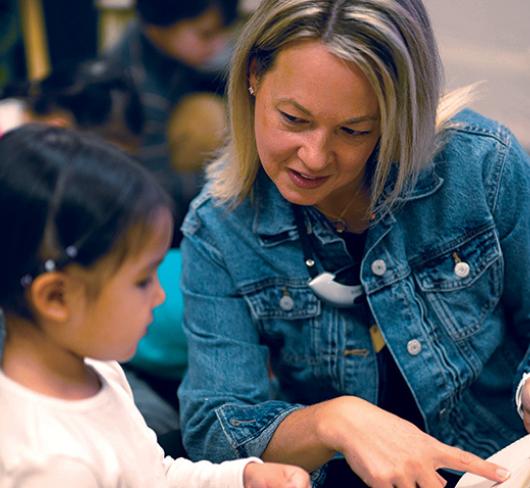Imagining Poverty: ETFO’s Professional Learning Projects: Opening Our Minds, Opening Our Doors
A funny thing happened while working on our anti-poverty project. We learned something! We learned that it isn’t so much what we can do for students, but how we do it that makes a difference. We didn’t set out with this as our goal, but it quickly became obvious that our professional learning was making a profound difference.
An enthusiastic start
The ETFO anti-poverty grant allowed us to provide something extra for the students at Sutton Public School. Students need a variety of life experiences in order to compare their lives with the literature they read and the stories they write. We planned trips, performances, and extra academic programs both in and out of school, and used the grant money to subsidize all of these so that all of our students could take part. We looked to enrich existing programs and introduce innovative new projects that could finally get off the ground with financial support. Creating a learning team had long been a goal, but we needed an impetus.
The learning begins
We developed a core of 10 staff who made up our leadership team and selected material to study. We soon found that our learning was having a startling effect on us and we began to examine our own practices and approaches. The leadership team soon swelled to a professional learning community (PLC) of over 20.
What poverty means to us
In Understanding Poverty, Ruby Payne defines poverty as “the extent to which an individual does without resources,” these resources being financial, emotional, mental, spiritual, physical, support systems, relationships, role models, and knowledge of hidden rules. Many of our students’ families experience this poverty – their lack of financial resources compounded by the lack of these other resources. This led us to begin to question our approaches to instruction, homework, discipline, and extracurricular activities – we were looking at every aspect of the school day through these new lenses.
Innovative thinking — novel delivery!
In January we re-examined the individual initiatives within the anti- poverty project.
- Our professional learning needed more funding, as we had so much more to study and accomplish. We explored new materials (such as Star Teachers of Children in Poverty by Martin Haberman) and new methodologies. We even had a movie night to watch FreedomWriters.
- We initiated new programs for students and resurrected some old ones. We restarted Rainbows, a successful support program for students who had experienced a loss in their lives, and gave it an influx of new resources.
- We determined that many Sutton PS students were hands-on learners, and this led us to resurrect an industrial arts program that had existed many years previously.
Re-thinking discipline
We decided to implement Restorative Approaches to better deal with conflict, behaviour and discipline. This is a York Region initiative based on the belief that people are more likely to make positive change when those in authority do things with rather than to them. Our study of Payne made us realize that discipline for students from poverty is usually about penance, not change, which contributes to their continued struggle. Discipline should promote successful behaviours and should be seen as a form of instruction. By under- standing the behavioural characteristics of students in poverty, we could then implement a discipline plan that not only addressed inappropriate behaviour, but do so in a way that allowed students to reflect on their behaviours, take responsibility for the harm they had caused, and seek to repair the harm done to others.
Guess who’s coming to dinner
Sutton Public School is one of 25 schools in York Region designated as Performance Plus (P+), meaning that, due to challenges, they are given extra resources and supports to help ensure academic success. The P+ program was developed in part based on the theories of Gene Maeroff as described in his book Altered Destinies: Making Life Better for Children in Need. Maeroff states that students in poverty need to develop “social capital” – the skills and ability to function and navigate in society. To build social capital children need a sense of connectedness with their community. Understanding that schools are part of their larger community allows students to learn to function within it.
With a sense of connectedness in mind, we developed an exciting initiative. In our original project proposal we had thought providing financial support for community outreach projects on a class-by-class basis would work; however, upon review it was felt that a school-wide approach would be better. So we decided to invite the community for dinner. Students would be involved, from set-up to clean-up, from serving and greeting, from decorating to entertainment. Hands-on involvement would allow students to build their social capital, helping them to see how the community is connected to the school, and building empathy, initiative, and responsibility. A community dinner would also give us a chance to thank all those groups and individuals who had helped us over the years.
We are committed to providing the best we can for the students of Sutton P.S. This means constant reflection on all of our practices. The provision of funds from ETFO opened the door to allow us to develop new ways of thinking, approaches, and skills for students and staff alike. We hope that we will see the legacy of this grant in student academic success, as well as in the growth of staff as lifelong, reflective learners. We already have seen that it is money well spent.
Resources
Haberman, Martin. Star Teachers of Children in Poverty. West Lafayette, IN: Kappa Delta Pi, 1995.
Haberman, Martin. Star Principals Serving Children in Poverty. Indianapolis, IN: Kappa Delta Pi, 1999.
Maeroff, Gene. Altered Destinies: Making Life Better for Children in Need. New York, NY: Palgrave McMillan, 1998.
Payne, Ruby K. A Framework for Understanding Poverty, 4th Ed. Highlands, TX: aha! Press, Inc., 2005.
Freedom Writers, Paramount Pictures, 2007.

